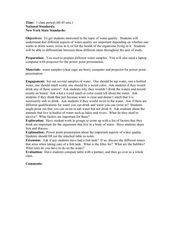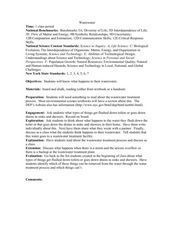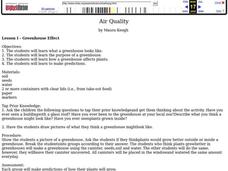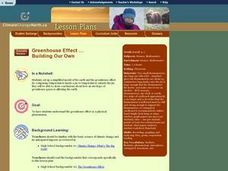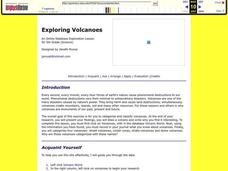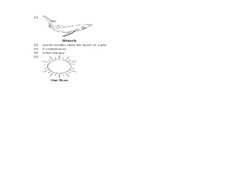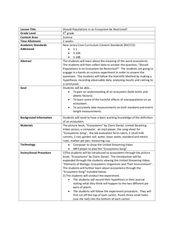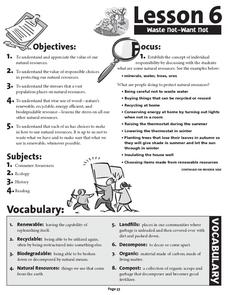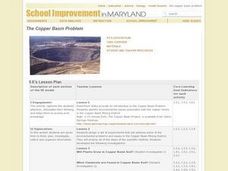Curated OER
Water Quality with Samples
Young scholars recognize whether one wants to drink water, swim in it, or for the health of the organisms living in it. They prepare different water samples to observe and collect samples regarding the water quality.
Curated OER
Land Use Change Introduction
Students discuss the major changes that have taken place in the Hudson Valley over the past 400 years. They use aerial photos to describe major trends in Dutchess County. Students view a PowerPoint presentation. They work in small groups...
Curated OER
Wastewater
Students discuss what happens to their wastewater. They read about the wastewater treatment process. Students are asked what types of things get flushed down toilets or goes down drains in sinks and showers. They are taught what happens...
Curated OER
Hudson Valley Rocks
Students identify each of the rocks provided and locate where in the valley they are found. They explain why the rocks came to be as they are in each location. In addition, they relate the exercise to how the Hudson Valley's geologic...
Curated OER
Glacial Groundwater
Students study glacial deposition and groundwater in Dutchess County, new York. They identify the permeability rates in different glacial deposits and relate this information to ground water capacity of sediments found in Dutchess...
Curated OER
How Much Water is in That River?
Students practice measurement using the Hudson River. They calculate the discharge measurement at a location on the Hudson River using ingenuity and a topographic map.
Curated OER
Careers With an Aquatic Emphasis
Students are introduced to careers with an aquatic emphasis. They take a self-evaluation test on what they enjoy in school to determine which career is right for them. They listen to people in the field discuss what their job is like.
Curated OER
Composting
Using 2-liter bottles, junior ecologists create composting tubes in which they place nitrogen-rich and carbon-rich materials. They observe what changes occur over two weeks' time. Provide more specific direction to your class as to what...
Curated OER
Air Quality
Students participate in many activities examining air quality. They examine the purpose of a greenhouse and make predictions. They also collect data and make graphs and charts.
Curated OER
Greenhouse Effect ...Building Our Own
Young scholars explore the greenhouse effect. They set up a simplified model of the earth and the greenhouse effect. Students compare temperatures inside a jar to temperatures outside the jar. Pupils collect information and create a line...
Curated OER
Nature Rules In The Great Flood of 1993
Students examine the event of the Great Flood of 1993. Using the internet, they research the economic, social and ecological changes that impacted the area. They conduct a town meeting in which they debate the positives and negatives of...
Curated OER
Gallery Walk Questions on Rivers
A Gallery Walk is a technique that allows small groups to visit different stations, where they examine and discuss materials about an overarching topic. Questions about rivers and fluvial processes are available in this resource;...
Curated OER
Gallery Walk Questions on Earth's Radiation Balance
Questions that can be used in a lesson on Earth's radiation balance are suggested in this resource. It is not a lesson plan, per se, but it is a list of questions for stations within a "Gallery Walk" lesson. The link to how Gallery Walks...
Curated OER
Exploring Volcanoes
Fifth graders use the ERIC database to find information on volcanoes. At the end of their research they present their findings, draw a volcano, and write bout what they found interesting about it. They also classify and categorize the...
Curated OER
Properties of Liquids
Students describe properties of liquids and use descriptive language as a springboard to develop precise vocabulary for properties of liquids. They also use vocabulary as practiced with liquid-vocabulary card games. Finally, students...
Curated OER
Science Review for Grade 3 (3.5)
In this science review for grade 3 (3.5) worksheet, 3rd graders answer 25 multiple choice questions in standardized test format about fossils, simple machines and heat transfer.
Curated OER
Will It Grow?
Fifth graders conduct experiments involving plants. In this science lesson plan, 5th graders design an experiment involving plants. Students use the scientific method to design their experiments.
Curated OER
The Biogeochemical Cycles
The majority of this presentation is a collection of diagrams and graphs that back your lecture on biogeochemical cycles. The last few slides define ecosystems and the Gaia hypothesis. You may find these slides valuable, but will...
Curated OER
Should Populations in an Ecosystem be Restricted?
Fourth graders experiment to determine how overpopulation effects ecosystems specifically plants. In this ecosystem lesson, 4th graders conduct an ecosystems experiment after listening to Claire Daniel's, Ecosystems. They watch a video,...
Curated OER
Xeriscaping In Your Community
Fourth graders participate in a service-learning project. They design landscaping that maximizes water use and utilizes indigenous plant species. Afterward, they advertise and present their xeriscape garden at a school function such as...
Curated OER
Dirty Decomposers
Learners explore the ecosystem by conducting a ziploc bag experiment. In this recycling lesson, students identify decomposer organisms in our environment and how they speed up the recycling process. Learners utilize a ziploc plastic bag,...
Curated OER
Waste Not Want Not
Learners are introduced to the need to save natural resources. Through inquiry, hands-on activities, and problem solving, students increase their understanding of solid waste materials and the need to reduce, recycle, and reuse.
Curated OER
Parts of an Ecosystem
Fourth graders study the Great Salt lake and the ecosystem that encompasses it. They study the relationship between an individual of a species, a population of that species, a community that includes that population, and the...
Curated OER
The Copper Basin Problem
Learners view a video about how human actions impact the environment. They design a set of experiments to address some of the problems and issues raised by the video.
